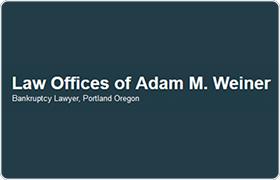Silverton Collection Lawyer, Oregon
Sponsored Law Firm
-
 x
x

Click For More Info:
-
Law Offices of Adam M. Weiner
8624 SE 13th Ave Portland, OR 97202» view mapBankruptcy & Debt Premier Bankruptcy Attorney
Life doesn’t always have to be hard. Consult with a bankruptcy attorney who looks out for your best interests. Call today to begin the process for a fresh financial start.
503-719-5123
Adam M. Weiner
✓ VERIFIED *Status is reviewed annually. For latest information visit hereBankruptcy & Debt, Credit & Debt, Collection
Adam Weiner has been practicing law in Oregon since May 1998. After successfully spending many years representing individuals in different types of... (more)
A Richard Vial
General Practice
Status: In Good Standing *Status is reviewed annually. For latest information visit here Licensed: 44 Years
A. Richard Vial
Construction, Aviation, Civil Rights, Collection
Status: In Good Standing *Status is reviewed annually. For latest information visit here Licensed: 44 Years
Amber N Wolf
Bankruptcy, Employment, Collection, Credit & Debt
Status: In Good Standing *Status is reviewed annually. For latest information visit here Licensed: 22 Years
Arusi R Loprinzi
Labor Law, Civil Rights, Contract, Collection
Status: In Good Standing *Status is reviewed annually. For latest information visit here Licensed: 51 Years
August Eric Klatt
Federal, Family Law, Collection, Personal Injury
Status: In Good Standing *Status is reviewed annually. For latest information visit here Licensed: 49 Years
Brian D. Chenoweth
Eminent Domain, Franchising, Collection, Products Liability, Real Estate
Status: In Good Standing *Status is reviewed annually. For latest information visit here Licensed: 30 Years
Christopher Michael Veley
Contract, Collection, Environmental Law Other, Civil Rights
Status: In Good Standing *Status is reviewed annually. For latest information visit here Licensed: 25 Years
Courtney Allen Cross
Federal, Credit & Debt, Collection, Bankruptcy & Debt
Status: In Good Standing *Status is reviewed annually. For latest information visit here Licensed: 31 Years
Craig Gerard Russillo
Foreclosure, Civil Rights, Credit & Debt, Collection
Status: In Good Standing *Status is reviewed annually. For latest information visit here Licensed: 28 Years
 Adam M. Weiner Portland, OR
Adam M. Weiner Portland, OR Practice AreasExpertise
Practice AreasExpertise
